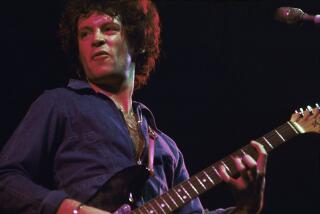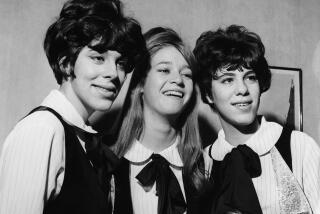Appreciation: Remembering the Cranberries’ Dolores O’Riordan, whose voice was truly her own
In the 1990s, the Cranberries were easy to view as mere passengers on a number of bandwagons.
The Irish quartet followed Sinéad O’Connor and the Frames (not to mention “The Commitments”) in establishing that country’s idea of post-U2 pop stardom. Frontwoman Dolores O’Riordan’s gender ensured that the band was packaged alongside Liz Phair and 4 Non Blondes in that decade’s women-who-rock movement.
Even the choice of Samuel Bayer to direct the video for “Zombie” — the group’s breakout 1994 single that topped Billboard’s alternative chart — put the Cranberries in league with Nirvana and Blind Melon, to name two acts that crashed MTV with earlier Bayer-helmed clips.
Yet O’Riordan’s voice stood out.
The singer, who died Monday at age 46 of an undetermined cause, had a high, airy tone that could turn ferocious without warning. And instead of flattening out her Irish brogue (as Bono did in U2’s mid-’80s hits), she emphasized its breaks and curls, decorating the catchy melodies she wrote with florid vocal runs inherited from Celtic tradition.
O’Riordan’s singing marked her as an original even as the Cranberries seemed determined to fit in.

Listen to “Dreams,” the band’s debut single, which helped drive its knowingly titled 1993 album, “Everybody Else Is Doing It, So Why Can’t We?,” to quintuple-platinum sales. In this song the shimmering guitars and propulsive beat are shamelessly ripping “I Melt With You,” Modern English’s indelible new wave hit from a decade earlier.
Yet O’Riordan makes the song her own with a desperate, yodeling vocal that conjures some ancient emotion.
Something similar happens in “Linger,” the Cranberries’ other big hit from that first album, where O’Riordan’s accent comes through strong in an otherwise gentle acoustic ballad.
And then, of course, there’s “Zombie,” with O’Riordan pushing her voice to a jagged extreme to embody the pain caused when two young boys were killed in a street bombing by the Irish Republican Army in 1993.
As in “Dreams,” the song’s guitars — here heavy with grunge-era fuzz — are clearly seeking a foothold among American listeners (which indeed “Zombie” created for the band). O’Riordan, though, seems deep in her head, concerned only with channeling her sorrow over the violence ripping apart her home.

After “Zombie,” the Cranberries ventured deeper into politics, albeit to diminishing returns; O’Riordan’s lyrics grew both clumsier and more strident — hardly a formula for success at a moment when Smash Mouth and the Squirrel Nut Zippers had moved in to colonize alt-rock radio.
Still, her singing stayed distinctive until the band broke up in 2003. Later O’Riordan started a solo career, though it too relied on material that felt unworthy of her voice. (Perhaps the singer-without-a-song thing is why she eventually agreed to appear as a judge on Ireland’s version of “The Voice.”)
In 2009 the Cranberries reunited, and last year — not long before Eminem sampled O’Riordan’s signature keen from “Zombie” — the group released an album with newly recorded acoustic renditions of its best-known songs.
That’s typically an indication that a veteran act has run out of inspiration, which appears to have been the case with this one.
But to hear O’Riordan deliver those breathy trills in “Dreams,” 25 years after the tune made her a star, is to understand that what she hadn’t exhausted was her ability — to nail challenging notes, to provide local color, to find space for personal expression in a form often defined by groupthink.
Twitter: @mikaelwood
ALSO
Coachella is going without a single rock headliner for the first time
Inara George on her stirring new album and the family tragedy that once defined her
With Oscar nominations on the horizon, here’s how voters can get the song category right
More to Read
The biggest entertainment stories
Get our big stories about Hollywood, film, television, music, arts, culture and more right in your inbox as soon as they publish.
You may occasionally receive promotional content from the Los Angeles Times.







